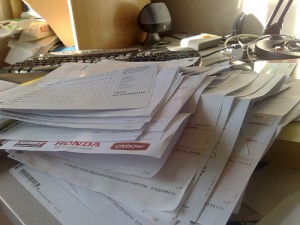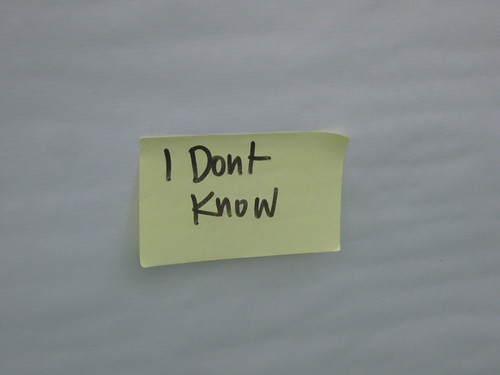 (Photo by Chad Jones)
(Photo by Chad Jones)
Conventional wisdom says that buying is preferable to renting. Instead of throwing money away on a home, you can invest in your future and have the sense of fulfillment that comes from owning a home. Turns out, conventional wisdom is wrong. Today, many long-term renters are in a much stronger financial position than many recent homebuyers, and the last thing these homeowners are feeling is contentment. But the combination of firesale prices on homes, the drop in mortgage rates, and government assistance in the form of the first time home buyer tax credit, may have you reconsidering the idea of buying your own home. Is now a good time?
The Good
Here are a few of the reasons why now is a better time to buy a home than it has been at any point in the past few years:
Tax Credits
In the stimulus plan signed by President Obama, there is a first-time home buyer tax credit of $8,000, provided that you stay in the home for 36 months. This isn't a tax deduction like your mortgage interest, which reduces your taxable income - a tax credit actually reduces your total income taxes owed. In addition, some states, such as California, are offering tax credits for home buyers that will further reduce your tax liability. Keep in mind that the federal program ends on December 1st of this year, and while it could easily end up being extended, it isn’t a given.
Rates last week dipped to an all-time low when the Fed announced that it would continue buying additional mortgage backed securities. Even though they ticked back up slightly in the past few days, with full income documentation and good credit, you can easily get down to 4.5% on a conventional 30 year fixed if you have 20% down, and if you want to get into an FHA loan, you can more typically get around 5.0% with a down payment of only 3.5%. Be careful when shopping for rates online, and think twice before giving out personal information. It is far better to ask friends and family for a strong personal recommendation, and use the information that you see on sites such as bankrate.com to approximate where your rate should be. Keep in mind that everyone’s scenario is different and there are a lot of new rate adjustments for conventional loans that didn’t exist in prior years, so you can easily end up paying 1 point (or percentage of the loan amount) for a loan t hat might cost your friend zero points for the same rate on the same day with the same lender.
Because You Don’t Absolutely Need to Buy
The best time to shop for a home is when you don’t need to. You can be as aggressive as you want to on your offer, and time is on your side because prices aren’t going to go back up overnight. If you are patient, you can find a home that you love, and just make sure that you can comfortably afford it and have a long-term plan to keep the property.
The Bad
These are factors that should not be driving your motivation to purchase a home right now:
Timing the Market Bottom
The same advice that applies to the stock market applies to the housing market. Don’t try to time it. If you have played around with the stock market in the past year and tried to catch a falling knife in the hopes of maximizing your return, you can probably look at the scars on your financial statements and let it serve as a reminder not to time the bottom. The turnaround in prices is gradual, and you are not going to miss out on an instant, overnight spike in real estate prices, no matter how fast the bank-owned properties are selling locally.
The Illusion of the Discount
Perhaps a new development popped up three years ago and was so shiny and perfect that you would have taken a third job to afford it. Now, the model that you love has popped up for $400,000 and all of the recent sales were at $450,000. In a stable market, that is great, but if you live in a declining market, you have now become the new comparable sale that any listings in the development in the near future will be measured against. So, if you buy this place for $400,000, and your new neighbor decides to move, they now will likely be advised by their real estate agent to price their property at or below your price in order to sell quickly. The same holds true for purchasing bank-owned properties. Bank-owned sales may be somewhat less frequent and given slightly less weight in determining the next sales prices in your neighborhood. However, if you buy in a neighborhood with a relatively high level of short sales and foreclosures, that great deal you just got on the bank-own ed property just set the bar lower for the whole neighborhood.
The Ugly
If you don’t know what you are doing or have enough of a cash reserve to justify the risk, this real estate market can eat you alive, especially if you are short-sighted.
Fix It and Flip It
Unless you are lightning fast, experienced at managing renovation projects and holding plenty of cash that you are comfortable risking, that late night real estate fix-and-flip infomercial that was recorded in 2003 should not be considered your ticket to financial freedom. Of course there are gurus who have been waiting for this opportunity, and you are driving around listening to Robert Kiyosaki on iTunes with your Bluetooth intact looking for the bargain of the century. Just do your research, and don't think that any particular property is the last opportunity you will ever have to get a great deal.
Until you see your local median price leveled off or even slightly increasing for a few months consecutively, you are dependent on sweat equity, which in many cases is wiped out by a few homes in the neighborhood going into foreclosure and further reducing home prices. Again, this market has become hyperlocal, down to the subdivision. In Orange County for example, prices for stronger neighborhoods may be down only 10% in the last year while properties less than a mile away have been cut in half or more in extreme cases.
Are you really ready?
How much are you paying now for rent? You should look at a good principal and interest calculator or talk to your lender to get the whole picture, including monthly amounts for taxes, insurance, any applicable homeowners association dues, and any applicable mortgage insurance. This is important even if you plan on paying taxes and insurance on your own (rather than impounding them and making monthly payments to the lender) because you will want to make sure to budget monthly to set aside for these expenses. So, if you are paying $1,500 currently for rent, and the new home will be $2,500, put your budget to the test and see how well your finances run when you put the amount of the increased housing expense (in this case $1,000) into your savings account. Take it out right when you pay your rent, and don’t touch it. This is a great test of how much you can really comfortably afford, and of course has the nice side effect of padding your savings for a few months b efore you start shopping for a home.
Of course, if you have a long-term plan to be in the home, the fluctuations and potential decrease in value in the near term doesn’t need to get you down, as the only price that matters is the price you are able to sell for when you need or want to move.

Read more about Should You Buy a Home Right Now?…
 If the current recession economy has taught us anything, it’s that no matter how strong a position you think you have, no job is completely safe when companies look to downsize. I think there are better ways to handle the situation than putting people who depend upon every penny of their job earnings to be able to put food on the table, but then again I didn’t graduate from executive genius school…
If the current recession economy has taught us anything, it’s that no matter how strong a position you think you have, no job is completely safe when companies look to downsize. I think there are better ways to handle the situation than putting people who depend upon every penny of their job earnings to be able to put food on the table, but then again I didn’t graduate from executive genius school…

 Cars.com’s “Kicking Tires” blog
Cars.com’s “Kicking Tires” blog 









 Gender equity has been difficult to come by when it comes to how much a woman earns versus how much a man earns. Numerous countries have been more forward thinking, leaving the door open for women to prosper in their careers and ability to access short-term
Gender equity has been difficult to come by when it comes to how much a woman earns versus how much a man earns. Numerous countries have been more forward thinking, leaving the door open for women to prosper in their careers and ability to access short-term  A new type of business has sprung up as uninsured Americans desperately try to find ways to afford the medical care they need. Planet Hospital and other firms like it aid people with medical travel planning.
A new type of business has sprung up as uninsured Americans desperately try to find ways to afford the medical care they need. Planet Hospital and other firms like it aid people with medical travel planning. After much anticipation, Tesla Motors, announced that it will soon begin production on an all-electric sedan. The prototype was put
After much anticipation, Tesla Motors, announced that it will soon begin production on an all-electric sedan. The prototype was put  Several newspapers recently have decided to cease print operations and become online-only news operations. It seems this trend is creeping into the magazine industry now, too.
Several newspapers recently have decided to cease print operations and become online-only news operations. It seems this trend is creeping into the magazine industry now, too. You’ve made it! After reading the conclusion of this four-part article (here are parts ONE, TWO and THREE), you will know exactly what to do with your grocery store haul. Moreover, you’ll be armed with some great ideas for growing your own food, even if you live in the city.
You’ve made it! After reading the conclusion of this four-part article (here are parts ONE, TWO and THREE), you will know exactly what to do with your grocery store haul. Moreover, you’ll be armed with some great ideas for growing your own food, even if you live in the city.

